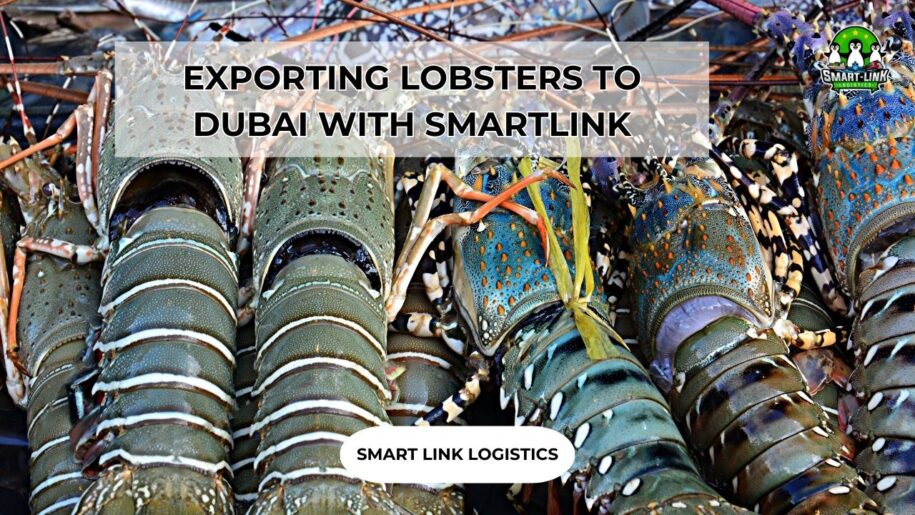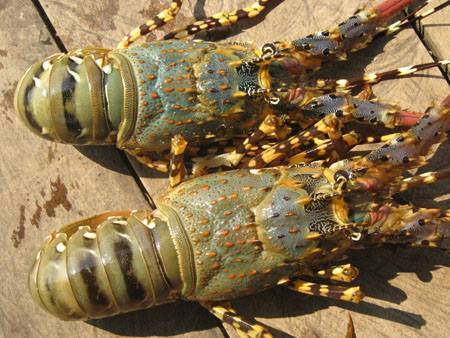
EXPORTING LOBSTERS TO DUBAI WITH SMARTLINK
Vietnamese lobsters have become increasingly attractive to Vietnamese seafood businesses aiming to tap into the high-potential Dubai market. However, to succeed in exporting lobsters, especially to markets with strict requirements like Dubai, businesses must thoroughly understand the procedures, documentation, and legal conditions involved. The following article provides essential insights on exporting lobsters to Dubai with SmartLink.
1. Overview of Vietnam’s Lobster Exports
Vietnam is one of the world’s leading lobster exporters, known for its stable output and high-quality products. The demand for lobster in Dubai and other Middle Eastern countries is rising as it is valued not only for its nutritional content but also for its high commercial value. With an open trade policy and international trade agreements, exporting Vietnamese lobsters to Dubai has seen positive progress. However, to maintain and expand this market, businesses must meet Dubai’s stringent standards on quality and food safety.

2. Required Documentation
Exporting lobster to Dubai requires businesses to prepare the necessary documentation. Below are some essential documents:
-
Business License Verification:
Ensure the business license includes seafood as a trade activity. If not, businesses must apply for an export permit for this product. Notably, exporting lobsters requires a plant code from the provincial NAFIQUAST Agency; without it, export certification will not be issued. -
Aquatic Animal Quarantine Procedure (Phyto):
This is a mandatory requirement before export. Source documents from farming and trade units must be clear to ensure traceability. -
Detailed Information on Lobster Species:
Include species name, scientific name (both English and Vietnamese) to verify if the lobster species is classified as rare or under conservation. This helps businesses avoid legal risks when exporting. -
Invoice, Packing List, and Original Contract:
These are the basic documents required for export. -
Halal Certification:
Dubai requires all products for consumption to have Halal certification, provided by the manufacturing facility to meet Muslim standards. -
Original Health Certificate (HC):
Issued by the shrimp farming facility, this certificate ensures the product meets food safety standards. Businesses should contact the Ministry of Health for assistance in obtaining this certification. -
FRIS from Dubai Municipality Food and Safety Department:
This mandatory permit must be obtained directly by the importer in Dubai from the Dubai Municipality Food and Safety Department. Note that shipping agents in Dubai cannot assist customers in obtaining this permit.
NAFIQUAST, formerly NAFIQAD, is the national agency for managing the quality of agricultural, forestry, and fishery products under the Ministry of Agriculture and Rural Development (MARD). It plays a crucial role in ensuring the quality and food safety of export products, particularly for seafood items like lobster. A NAFIQUAST certification will help lobsters meet international standards when exporting to Dubai.
3. HS Code for Lobsters
The HS code for fresh or frozen lobsters is 030611. This code allows businesses to carry out customs procedures and tax declarations easily. Depending on the type of lobster, the HS code may vary based on the product’s specifications and condition (fresh, frozen, or processed). Businesses should confirm the exact HS code to ensure accuracy during customs declaration.
4. Steps to Export Lobsters to Dubai
The export process for Vietnamese lobsters to Dubai involves the following basic steps:
-
Step 1: Verify business license and export plant code. Ensure the business license includes seafood items. If not, businesses must apply for an export permit from the local NAFIQUAST Agency.
-
Step 2: Prepare quarantine documents. Complete aquatic quarantine procedures (Phyto) and ensure all source documents from farming to trade units are clear for traceability.
-
Step 3: Complete export documents. Prepare all necessary documents, such as Invoice, Packing List, original contract, and quality certifications like Halal and HC, to ensure compliance with Dubai market standards.
-
Step 4: Obtain FRIS approval from Dubai. The importer in Dubai must apply directly for the FRIS permit from the Dubai Municipality Food and Safety Department, as this is a mandatory requirement for all seafood products imported into this market.
-
Step 5: Complete customs procedures and arrange international shipping. Once all documents and permits are in order, proceed with customs procedures in Vietnam and select an appropriate shipping method to ensure safe delivery to Dubai.
Conclusion
Smart Link Logistics hopes this article provides you with a better understanding of lobster export procedures to Dubai and the necessary documentation requirements. For further information or assistance with transport procedures, please contact SmartLink for professional and dedicated consultation.
Hotline: + 84 935 766 039 to know more about our services

If you require assistance with international import and export of goods, please contact our team at Smartlink Logistics. We are available to provide you with professional guidance on our services and the necessary customs procedures.
SMART LINK: BEST SERVICE BEST YOU


































